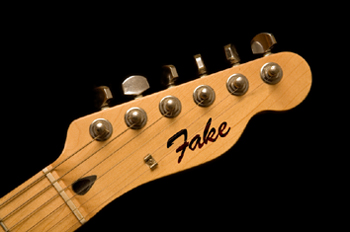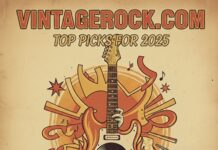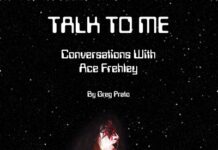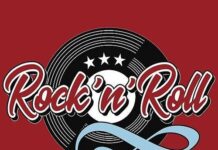Their names are as iconic and legendary as the musicians that have played them: Gibson, Fender, Gretsch, Epiphone. In the hands of guitar legends like Jimi Hendrix, Stevie Ray Vaughn and Eric Clapton, these American-made instruments helped create the sound and style of rock & roll as the world knows it today.
From the solid body, single-cutaway styling of a Gibson Les Paul to the sleek contours of the Fender Stratocaster and Telecaster guitars, the instruments and many of their top-level rivals are being cloned in massive Chinese guitar factories and sold through web sites and eBay for as low as 10 cents on the dollar compared to the genuine guitars. The instruments are all stamped with trademarked U.S. company names and styled after their American counterparts, complete with logos, stickers and cases. Only guitar experts and very savvy guitar buyers can identify the knock-off guitars as fakes, with younger or more inexperienced buyers in danger of committing a felony while buying what they think is their dream guitar.
Even though they are stamped “Made in USA,” that once-revered product label doesn’t necessarily mean something was indeed made in America; not in the age of the 21st century global marketplace where clandestine factories are as plentiful as American convenience stores, and where copyrights, patents and trademarks are as respected as Paris Hilton’s privacy.
Motley Crue bassist Nikki Sixx, in his 26th year with the band and a lifelong musician, was completely unaware that counterfeit Chinese guitars were such a huge problem in the industry. Sixx recently unveiled his signature bass with Epiphone Guitars, and had a popular model available through Gibson for several years.

Nikki Sixx
“These are being made in China, with Gibson and Fender and other maker names on them, and selling them as real guitars? Wow! That’s brand infringement and false advertising,” at the very least, says Sixx. “If somebody saves and saves to buy their dream guitar, and later finds out it’s not what they thought it was — it’s a total fraud. When people buy a brand name, it’s something they trust and believe in.”
Could this sudden surge in counterfeit Chinese Les Pauls and Stratocasters be rock & roll’s dirty little secret? Except for local coverage in North Carolina and Long Island, New York, about a couple of counterfeit guitar seller’s arrests, and perhaps a few Internet posts, the counterfeit guitar problem has so far managed to stay out of the limelight. Not even Kiss guitarist Ace Frehley was aware that his signature model Gibson and Epiphone guitars were being replicated in China. His Les Paul models are some of the most counterfeited guitars available. When contacted for comment, Frehley (through his publicist) did not accept an invitation for an interview. Legendary rock guitarist Peter Frampton (also a heavily counterfeited Gibson Les Paul signature artist) also declined to comment, stating simply that he concedes it is “a big issue.”
Influential jazz guitarist Al Di Meola, a widely recognized master of electric guitar who has performed with everyone from Stanley Clarke, Chick Corea and Paul Simon to Carlos Santana and Yngwie Malmsteen, was also surprised to learn of the recent surge in counterfeit Chinese guitars.
“Honestly, I wasn’t aware of the problem until your call,” Di Meola told me. “People with the power and the clout to do something about it need to get with the Attorney General and get this issue addressed. I also feel that eBay should be brought up on charges for allowing such a thing to happen on their site. It’s piracy and it’s illegal. People go to jail a long time for stuff like this.”
Di Meola urges players of all levels to seek out legitimate dealers and outlets instead of supporting the counterfeiters by saying that “buying from them is an embarrassment. Don’t do it.”

Al DiMeola
Our investigation of the manufacturers and sellers of counterfeit U.S. brand music instruments is merely the latest in a stream of counterfeit and tainted product headlines out of China in 2007. Beginning in March, thousands of pet owners around the world unknowingly fed their animals store-bought pet food that contained wheat gluten contaminated with melamine (a pesticide derivative). Menu Foods and other major companies issued recalls, but not before untold numbers of cats and dogs were fatally poisoned by the tainted food. Melamine is used in China to artificially inflate protein levels in wheat gluten, rice protein, corn by-products, and many other foods intended for animal and human consumption.
In June, counterfeit Colgate toothpaste originating from China was found to contain diethylene glycol, a common toxic ingredient in automotive coolant. Toys ‘R’ Us and Wal-Mart recently pulled vinyl bibs sold in their stores that were made by Hamco and other China-based manufacturers after the bibs were discovered to have lead levels well above federal safety limits for lead in paint. The most recent contaminated products from China involved Disney brand toys made by Mattel, who recalled over nine-million toys because of lead poisoning and choking risks to children.
“Counterfeit guitars are certainly part of this global problem”
Poison dog food and lead-tainted baby bibs may seem far removed from the proliferation of fake music instruments, but if you ask Elaine F. Marshall, North Carolina’s anti-counterfeit crusading Secretary of State, it is all interconnected.
“The same supply chain that brought in these counterfeit guitars can just as likely bring in weapons, dangerously-substandard electronics or medicines,” says Secretary Marshall.
Marvin Clark, one of Marshall’s Trademark Enforcement Section investigators, arrested a counterfeit guitar seller in June for selling fake Gibson Les Paul guitars out of his home. Steven F. Sexton pleaded guilty to two counts of criminal use of a counterfeit trademark for selling the guitars. Sexton had sold counterfeit Gibson’s to at least three victims, including a 15-year-old boy.
“Some say counterfeiting like this is a victimless crime, but when people have been injured, either physically or emotionally like the teenage victim in our recent case, that was more than a kid getting ripped off,” says Secretary Marshall. Like Nikki Sixx, Marshall believes the victim in her state’s case was unknowingly duped into buying something that wasn’t what it should have been. “His dreams of owning a quality Gibson Les Paul and using it as a tool to further his music learning were crushed,” she says.
Five counterfeit guitars were seized following a search of Sexton’s property. An extensive search of news and guitar databases appears to show Sexton’s conviction was a first for a counterfeit guitar seller in the United States.

Counterfeit guitar seller Steven Sexton
“It’s fraud, no way around it,” says George Gruhn, founder of Gruhn Guitars in Nashville, and one of the preeminent guitar experts in the world. “As an expert, they look fake to me, but maybe not to the average consumer. Nobody should be able to make new guitars from scratch that say Gibson or Fender unless they are Gibson or Fender or the other trademark-holding companies crafting their guitars.”
Gruhn believes ineffective international copyright and trademark laws contribute to the counterfeiting problem, along with the availability of cheap Chinese labor and the advent of Computer Numeric Controlled (CNC) machines. With the machine and a skilled technician inputting the numbers, any wooden, metal or plastic object can be copied down to the last millimeter.
According to 2005 music instrument and accessory sales figures from The Music Trades Magazine, global sales of guitars reached an all-time high of $17,856,539,000.00. Electric guitar sales for 2006 are down 9.5 percent from 2005.
No one can say for sure if counterfeit guitars significantly contributed to the drop in electric guitar sales last year. Because of the illegal and secretive nature of the manufacturing and sales of the guitars, no figures exist that can even estimate total yearly sales on the counterfeits. According to Paul Specht, Communications Director with Ibanez, one of the top global guitar brands, there is one certainty about counterfeit guitar sales.
“If the product coming out of Gibson or Fender or Ibanez or any legitimate guitar company was garbage, I might be more sympathetic to the counterfeiters, but it’s still theft,” says Specht. “That’s just not the case, though. The authentic product quality from all the genuine manufacturers is remarkably high. They’re really good instruments and they’re backed with great service.”
“You’ve gotta see this guitar!”
The journey into China’s guitar counterfeiting underworld started rather innocuously. While shopping on eBay for a guitar for Josh, my 14-year-old stepson, I typed “guitar” in the auction web site’s search window and hit the search button, which brought up over 70,000 listings. A curious entry stood out among the other well-written, attention-grabbing eBay listing headlines. I clicked on the listing title, and like Lucy in The Chronicles Of Narnia discovering a magical land where goat-human hybrids sipped tea and beavers spoke perfect English, I accidentally stumbled into the heart of the Chinese and global guitar counterfeiting ring.
The headline enticed with an offer to have “any guitar you want made” in their “own guitar factory.” The auction-listing owner was a seller named eChinaville, a member since May 29, 2003 and based out of China, though their listing appeared on the U.S. version of eBay and not on the China-based eBay site.
The auction itself wasn’t even for a guitar, or for a guitar building service. Instead, the auction appeared to be merely an advertisement for the seller’s website name, www.paylessguitars.com, based out of Beijing but without the usual “.com/cn” internet suffix that is supposed to be attached to all websites originating in China. (At press time, the eBay user name “eChinaville” was no longer a registered seller. The Payless domain name, however, disappeared for a week after they were informed that M&SR was writing a story about their activities. Their web site is now back up and online).

The headstock and body of the counterfeit Ace Frehley Les Paul models. Note the 3-screw truss-rod – a sure sign of a counterfeit Ace model. Authentic Frehley’s only have 2-screw truss-rod covers.
The Payless Guitar web site name was emblazoned in an html image at the top of the auction in violation of eBay seller rules. Although the website was not live in the auction, I typed the URL into my Internet browser. As the page loaded, guitar images began to download, with listings on the left side of the page showing names like Gibson, Fender, Gretsch and PRS guitars. Clicking on the “Gibson Electric Guitar” button revealed a page of Gibson Les Paul guitars offered at stunningly low prices for what appeared at first glance to be genuine, American-made Gibson guitars – complete with Gibson tags, stickers, manuals, cases and protective Gibson-branded plastic over the pickguard. The first clue that these were not authentic U.S. Gibson’s was the unusual finishes on the guitars. Some were offered in blue sparkle paint and others in purple see-through burst finishes, neither of which are finishes currently offered by Gibson guitars.
“You gotta see this guitar!” was all I could say as I summoned my wife over for a look. The first guitar listed was a Gibson Les Paul Supreme for sale at $269 with $110 shipping to anywhere in the world. Even with the $110 for shipping, $379 was an incredible guitar bargain. Fuller’s Vintage Guitar, an authorized Gibson dealer in Houston, Texas, recently had ten authentic Gibson Supreme Les Paul models in stock ranging from $2,899 to $3,999. Anson, a representative for Payless Guitars (most likely not his real Chinese name) offered to deliver to me ten Gibson Supreme models to the U.S. — with cases and an eleventh guitar as a free bonus — for $3800, shipping included.

Payless Guitars Web Site
With thousands of music instrument auctions listed from around the globe, it is apparently quite easy to slip a number of counterfeit instruments past the watchful eyes at eBay. A closer examination of eChinaville’s other auctions and their feedback revealed a second layer of deception. The first several pages of their feedback dating back to 2003 shows dozens of buyers leaving meaningless positive feedback for worthless auction items, a practice known as feedback manipulation. In the case of eBay user “yiluyangguang,” their feedback section contains 33 pages of fraudulent feedback (same for eBay sellers chenhai_222 and konglongxiaodian) obtained with clearly fake auctions for cheap toys, pictures of clothes from a magazine, and — most of the time — nothing at all, except for a random string of question marks as the auction title.
Further complicating eBay’s efforts to remove or block counterfeit guitar auctions are the misleading or ambiguous auction titles, particularly on eBay’s United Kingdom site. One seller using the name “webeing” (which is no longer a registered eBay seller name) offered a selection of 59 counterfeit Gibson, Ibanez, Gretsch and Epiphone guitars for sale as low as 99 Euros ($134 US) each. Again, like the eChinaville seller, “webeing” is another major Chinese counterfeiter using eBay as a pipeline for their main retail site, www.cnart2008.com. On their main site, they even have a link to their nonexistent eBay seller page that directs the user to the main China eBay home page.
Nichola Sharpe, an eBay representative, says the company has “never welcomed sellers of counterfeit goods.”
“With over 100 million listings worldwide, we can’t be the experts,” says Sharpe. “We don’t even have the items on hand to examine.”
That is where eBay’s VERO program comes in to play, says Sharpe. The program is a collaboration with registered trademark and copyright holders to report infringing eBay auctions. Gibson and Gretsch are confirmed eBay VERO members.
Craig Delsack, an New York attorney with years of experience in trademark, copyright and intellectual property law, concedes that the current international laws make it easy for Chinese counterfeiters to set up their operations.

Payless Guitars offers this fake Gretsch White Falcon – a model used famously by rocker Neil Young – for $210. Genuine Gretsch models typically run around $3,000.
“Chinese laws fall very short of international guidelines,” says Delsack. “Their laws are very lax, and their officials turn their eyes the other way when it comes to enforcement. Whereas the U.S. has Congressional codes that set forth copyright, trademark and patent laws, China is way behind us. Because of that, it makes it very hard to both find and prosecute the infringing manufacturers. It’s going to be difficult to do, but the entire world needs to support global ramifications and pressure China and these other countries to change their laws and enforce those laws.”
Peter Wolf, Director of Sales and Marketing for Paul Reed Smith Guitars, says counterfeit guitars aren’t cutting too deeply into PRS’ sales because “players interested in PRS guitars are very savvy, very educated buyers. The Chinese counterfeit quality is just so far away from the top quality of a genuine PRS guitar,” that very few PRS players would even think of using anything but a real PRS instrument.
“If you’re in the market for a guitar and you see something on eBay, online or locally that seems too good to be true — that old adage — then of course it probably is,” says guitar dealer George Gruhn. “If you’re not an expert, deal with local dealers you can trust. And if you’re selling or making these counterfeit guitars, you deserve what’s coming to you. It’s time the world started respecting copyrights, patents and trademarks.”




















